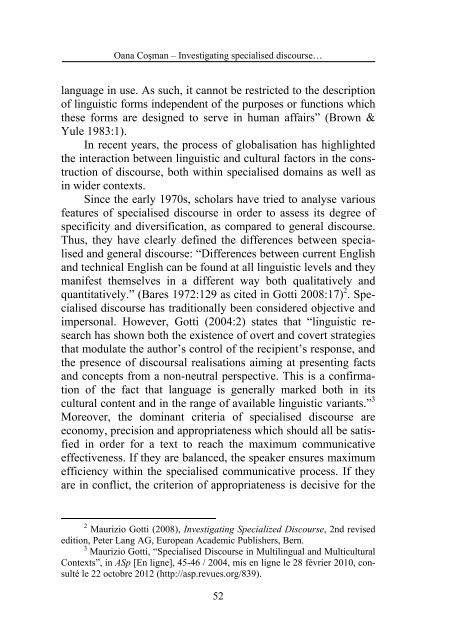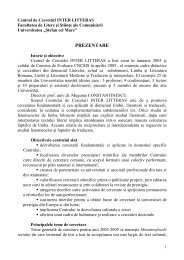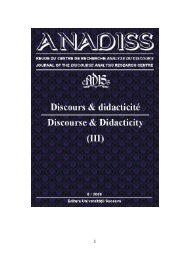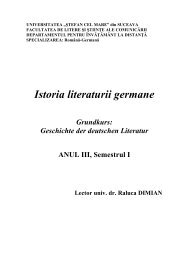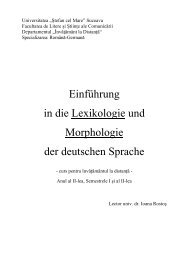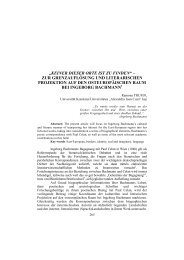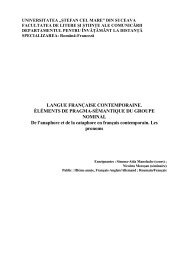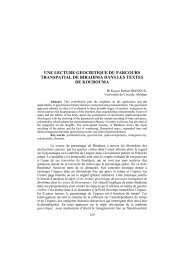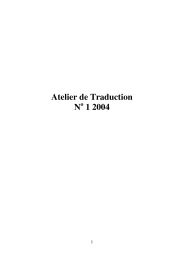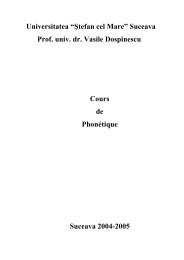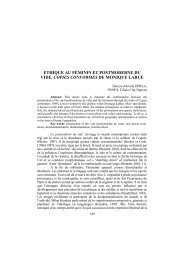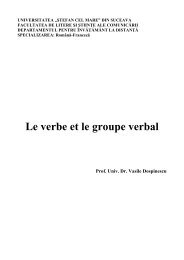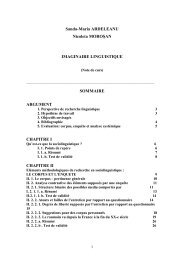Le discours de la francophonie
Le discours de la francophonie
Le discours de la francophonie
Create successful ePaper yourself
Turn your PDF publications into a flip-book with our unique Google optimized e-Paper software.
Oana Coşman – Investigating specialised <strong>discours</strong>e…<strong>la</strong>nguage in use. As such, it cannot be restricted to the <strong>de</strong>scriptionof linguistic forms in<strong>de</strong>pen<strong>de</strong>nt of the purposes or functions whichthese forms are <strong>de</strong>signed to serve in human affairs” (Brown &Yule 1983:1).In recent years, the process of globalisation has highlightedthe interaction between linguistic and cultural factors in the constructionof <strong>discours</strong>e, both within specialised domains as well asin wi<strong>de</strong>r contexts.Since the early 1970s, scho<strong>la</strong>rs have tried to analyse variousfeatures of specialised <strong>discours</strong>e in or<strong>de</strong>r to assess its <strong>de</strong>gree ofspecificity and diversification, as compared to general <strong>discours</strong>e.Thus, they have clearly <strong>de</strong>fined the differences between specialisedand general <strong>discours</strong>e: “Differences between current Englishand technical English can be found at all linguistic levels and theymanifest themselves in a different way both qualitatively andquantitatively.” (Bares 1972:129 as cited in Gotti 2008:17) 2 . Specialised<strong>discours</strong>e has traditionally been consi<strong>de</strong>red objective andimpersonal. However, Gotti (2004:2) states that “linguistic researchhas shown both the existence of overt and covert strategiesthat modu<strong>la</strong>te the author’s control of the recipient’s response, andthe presence of <strong>discours</strong>al realisations aiming at presenting factsand concepts from a non-neutral perspective. This is a confirmationof the fact that <strong>la</strong>nguage is generally marked both in itscultural content and in the range of avai<strong>la</strong>ble linguistic variants.” 3Moreover, the dominant criteria of specialised <strong>discours</strong>e areeconomy, precision and appropriateness which should all be satisfiedin or<strong>de</strong>r for a text to reach the maximum communicativeeffectiveness. If they are ba<strong>la</strong>nced, the speaker ensures maximumefficiency within the specialised communicative process. If theyare in conflict, the criterion of appropriateness is <strong>de</strong>cisive for the2 Maurizio Gotti (2008), Investigating Specialized Discourse, 2nd revise<strong>de</strong>dition, Peter Lang AG, European Aca<strong>de</strong>mic Publishers, Bern.3 Maurizio Gotti, “Specialised Discourse in Multilingual and MulticulturalContexts”, in ASp [En ligne], 45-46 / 2004, mis en ligne le 28 février 2010, consultéle 22 octobre 2012 (http://asp.revues.org/839).52


